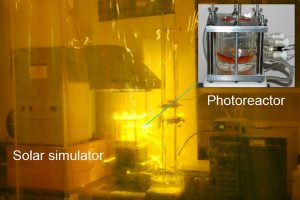June 22, 2016
By Sherri Shields
FSEC researchers and their Texas A&M University co-authors win Best Paper Award at the International Conference on Hydrogen Production (ICHP) in Hangzhou, China last month. Illustrating the novel approaches in solar hydrogen production, the paper, “Solar reactor investigation for the thermochemical steps of the sulfur-ammonia water-splitting cycle,” has also been included in a special issue of the International Journal of Hydrogen Energy.

“In our work, we presented the solar-driven hybrid sulfur-ammonia water splitting cycle (HySA) for hydrogen production. HySA is a promising technology for energy and environment applications, utilizing both solar photon and thermal radiation in a series of reaction steps. This study presented our efforts toward the design of a solar aerosol reactor for the thermochemical steps of the cycle. For this, we developed a conceptual particle model, based on our experimental and numerical findings,” said Agni Kalyva, Texas A&M University at Qatar.
Dr. Ali Raissi and Nazim Muradov of the University of Central Florida’s Florida Solar Energy Center (FSEC)—inventors of the original hybrid sulfur-ammonia water splitting cycle (HySA) for hydrogen production—co-authored the paper. Additional co-authors include: Dr. Arun Srinivasa, professor of mechanical engineering at Texas A&M University (College Station); Dr. Konstantinos Kakosimos, assistant professor in chemical engineering, Agni Kalyva, research assistant and presenter of the paper, and Aikaterini Vagia, postdoctoral research associate, all from Texas A&M University at Qatar.
Currently supported by the Qatar National Research Fund, the technology that was developed at FSEC under Department of Energy funding about a decade ago is now receiving renewed attention among solar and hydrogen researchers. It promises to substantially increase solar-to-hydrogen energy conversion efficiency through more efficient utilization of solar resource and, thus, bring the prospect of generating hydrogen fuel directly from solar closer to commercialization.
“The technology has the potential to make large scale storage of solar energy, an intermittent source, economically feasible,” said Muradov.
International Conference on Hydrogen Production (ICHP)
The International Conference on Hydrogen Production (ICH2P) is a multi–disciplinary international conference on the production of hydrogen through various thermal, chemical, biological and other methods, as well as its use in various systems, including fuel cells and combustion. It provides a forum for the exchange of latest advances and technical information, dissemination of new research developments in the areas of hydrogen production, storage and usage, and debate involving the future directions and priorities in the hydrogen economy for a sustainable future. For more information, visit http://ich2p-16.csp.escience.cn/dct/page/1
About FSEC
The Florida Solar Energy Center (FSEC), UCF’s energy research and education institute, was established in 1975. Located on the Cocoa campus of UCF and Eastern Florida State College, FSEC has gained national and international respect for its public and private partnerships, focusing on: solar energy, energy-efficient buildings, hydrogen and fuel cells, electric vehicles, smart-grid research, and testing and certification of solar equipment. The Center conducts continuing education and training programs for professionals, government and industry leaders around the world, in addition to Science, Technology, Engineering and Mathematics (STEM) opportunities for the future energy workforce. For more information, visit www.fsec.ucf.edu.
America’s Partnership University
The University of Central Florida, the nation’s second-largest university with more than 60,000 students, has grown in size, quality, diversity and reputation in its first 50 years. Today, the university offers more than 200 degree programs at its main campus in Orlando and more than a dozen other locations. UCF is an economic engine attracting and supporting industries vital to the region’s future while providing students with real-world experiences that help them succeed after graduation. For more information, visit http://today.ucf.edu
###
PR16-03